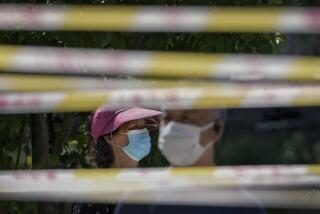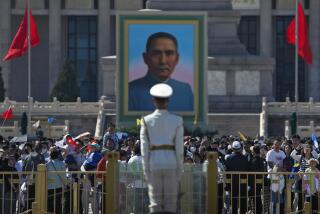World Health Organization Says Chinese SARS Case Is Confirmed
- Share via
BEIJING — The World Health Organization confirmed Monday that a 32-year-old television producer from southern China’s Guangdong province was the first known SARS case among the general public since the disease was contained in July.
Two recent cases in Singapore and Taiwan were linked to researchers reportedly exposed in their labs.
The WHO announcement, which followed a report of the case earlier in the day from China’s Health Ministry, came after exhaustive tests on the unnamed patient, the people he came in contact with and his immediate environment, including where he slept, ate, walked and what kind of rats inhabited his housing block.
Chinese officials reported that the television producer was in stable condition Monday afternoon and said those who came in contact with him had displayed no symptoms.
The confirmation followed reports of two other suspected cases of severe acute respiratory syndrome in the general public, one in Guangdong involving a waitress in a restaurant that serves wild animals -- subsequently denied as SARS by a Chinese official -- and another in the Philippines involving a domestic worker who had recently returned from Hong Kong.
“Everyone’s getting edgy,” said Bob Dietz, a WHO official in Beijing.
Officials with the health organization gave China solid marks Monday for quickly detecting the case involving the producer, isolating the man and bringing global health officials into the picture.
They added that many questions remained unanswered, however, with potential implications for public health worldwide. It is still not known how the patient came down with the disease or, more broadly, where SARS originates and what its exact link is with wild animals.
The government wasn’t taking any chances, however, as it announced Monday plans to shut down wild animal markets in southern China.
It also said it would slaughter up to 10,000 civets -- a catlike animal that is eaten in the south and is suspected of transmitting the disease -- possibly along with some kinds of wild dogs and badgers.
The pneumonia-like coronavirus, which first surfaced in Guangdong in November 2002, infected more than 8,000 people and killed 774 worldwide before it was brought under control.
In Hong Kong, news of the confirmed SARS case Monday triggered several preventive steps. These include more extensive temperature checks on the city’s shared border with Guangdong, restrictions on anyone arriving with a fever, testing of Hong Kong pneumonia patients who were recently in Guangdong and a requirement that all local health workers wear masks and frequently wash their hands.
“If you look at the risk factor, it’s still at a very low level,” said Hong Kong’s health director, Lam Ping-yan. “But we don’t want SARS to come back, so we need early detection.”
WHO scientists in Beijing also downplayed the danger and said travel throughout China remained safe. “We have to be clear about it,” said Henk Bekedam, WHO’s China representative. “It doesn’t mean one case leads to a public health threat.”
SARS can be eliminated with further monitoring, vaccines, research and surveillance by the international community, scientists say. China banned trade in civets in April, then reinstated it four months later against the advice of global experts. WHO scientists said Monday, however, that the massive culling of civets announced by China may go too far in the other direction.
There’s no proof that civets are the main conduit for the human form of the virus, researchers said. And the cull, if done improperly, could reignite SARS by subjecting animal workers and others to the virus through exposure to blood and tissue, said Jeffrey Gilbert, a WHO expert in the transmission of diseases between animals and people.
Hong Kong University infectious disease expert Yuen Kwok-yung countered it was better to be safe than sorry. “The civet kill is the best way to stop this before it gets started,” he said.
In recent months, China has sought to be more forthcoming about health-related problems after coming under harsh domestic and international criticism for its handling of the initial SARS crisis.
Hospitals and clinics are under orders to report possible cases immediately. In late 2002 and early 2003, government officials initially denied, then sought to downplay the epidemic, giving SARS more time and opportunity to incubate.
*
Magnier reported from Beijing and Marshall from Hong Kong.
More to Read
Sign up for Essential California
The most important California stories and recommendations in your inbox every morning.
You may occasionally receive promotional content from the Los Angeles Times.













